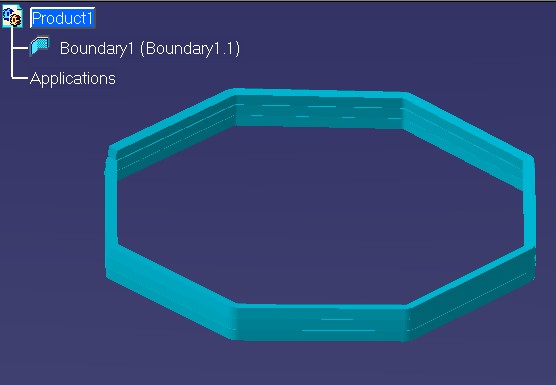This macro shows you how to create an ArrangementBoundary object under a Product.
This macro opens a new Product document and retrieves the ArrangementBoundaries collection from the Root Product via the ArrangementProduct object. It then adds an ArrangementBoundary object. Once the ArrangementBoundary object is created, the individual ArrangementNode's that make up the object are retrieved and the bend radius is applied on them.

CAAArrCreateBoundary is launched in CATIA [1]. No open document is needed.
CAAArrCreateBoundary.CATScript is located in the CAAScdArrUseCases module. Execute macro (Windows only).
CAAArrCreateBoundary includes the following steps:
- Prolog
- Obtaining the ArrangementProduct Object and the Associated Movable Object from the Root Product
- Creating the ArrangementBoundary Object under the ArrangementBoundaries Collection Object
- Modifying Properties (Defining a Rectangular Section, Changing the Visualization Mode and Bend Radii of the Nodes) of the Newly Created ArrangementBoundary object
- Epilog
Prolog
...
'----------------------------------------------
'Create a new product document
Dim objProdDoc As ProductDocument
Dim objRootProd As Product
Set objProdDoc = CATIA.Documents.Add("Product")
Set objRootProd = objProdDoc.Product
...
|
Once the new Product document has been created, fetch the ArrangementProduct and the associated movable object from the root product of the new product document.
Obtaining the ArrangementProduct Object and the Associated Movable Object from the Root Product
...
'----------------------------------------------
'Retrieving Root Product's Relative Axis and Position Information
Dim objMove As Move
Set objMove = objRootProd.Move
'----------------------------------------------
' Get ArrangementProduct
Dim objArrProd As ArrangementProduct
Set objArrProd = objRootProd.GetTechnologicalObject("ArrangementProduct")
...
|
The ArrangementBoundaries object is a collection object that manages ArrangementBoundary object's under a given ArrangementProduct. The movable object serves as the relative axis for the new ArrangementBoundary object to be created.
Creating the ArrangementBoundary Object under the ArrangementBoundaries Collection Object
...
' Create ArrangementBoundary under the Root Product
Dim dblBoundaryPoints(75) As Double
Dim dblMathDirection(3) As Double
Dim objArrBoundary As ArrangementBoundary
dblBoundaryPoints(0) = 300.0
dblBoundaryPoints(1) = 100.0
dblBoundaryPoints(2) = 0.0
dblBoundaryPoints(3) = 441.42
dblBoundaryPoints(4) = 158.58
dblBoundaryPoints(5) = 1.25
...
dblBoundaryPoints(69) = 158.58
dblBoundaryPoints(70) = 158.58
dblBoundaryPoints(71) = 28.75
dblBoundaryPoints(72) = 300.0
dblBoundaryPoints(73) = 100.0
dblBoundaryPoints(74) = 30
dblMathDirection(0) = 1.0
dblMathDirection(1) = 0.0
dblMathDirection(2) = 0.0
Set objArrBoundary = objArrProd.ArrangementBoundaries.AddBoundary(objMove, _
dblBoundaryPoints, _
dblMathDirection)
...
|
The newly created ArrangementBoundary object is visualized as a curve and does not have any section definition. In addition the nodes do not have any bend radius. We therefore define a rectangular section and change the visualization mode to solid.
Modifying Properties (Defining a Rectangular Section, Changing the Visualization Mode and Bend Radii of the Nodes) of the Newly Created ArrangementBoundary Object
... objArrBoundary.SectionType = CatArrangementRouteSectionRectangular objArrBoundary.SectionWidth = 10.0 objArrBoundary.SectionHeight = 10.0 objArrBoundary.VisuMode = CatArrangementRouteVisuModeSolid ' Define Bend Radius of Nodes Dim intK As Integer For intK = 1 To objArrBoundary.Nodes.Count objArrBoundary.Nodes.Item(intK).BendRadius = 10.0 Next ... |
Here we define a rectangular section and change the visualization mode
to CatArrangementRouteVisuModeSolid. A bend radius of 10 mm
is then applied to each of the ArrangementNodes that makes up the
object.
Epilog
... End Sub |